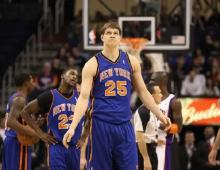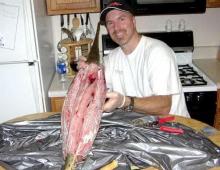Bartel tennis rating. Mona Bartel about her illness: I feel much better now
German tennis player Mona Barthel was born in 1990 in the city of Bad Segenberg. Her father also participated in athletics in his youth and excelled in several competitions. The eldest daughter in their family first started playing professionally, and little Mona Barthel, impressed by her play, also picked up a racket at the age of three.
For the first time, a German tennis player took part in a tournament under the auspices of International Federation tennis in 2007. Then she only managed to reach the quarter finals. Mona Barthel tried her hand at competitions of this type in subsequent years, but all that awaited her was reaching the finals. The first victory at the International Tennis Federation tournament came to the German tennis player only in 2010.
In total, Mona Barthel has six such titles, five of which she won single-handedly. The German tennis player distinguished herself at the Women's Tennis Association tournaments, where she won twice singles and alone, playing in pairs. The athlete’s achievements at the end of 2012 raised her to 39th position in the list of the best representatives of world-class tennis.
Mona Barthel(German) Mona Barthel; born 11 July 1990 in Bad Segeberg, Germany) is a German professional tennis player; winner of five WTA tournaments (three in singles).
general information
Mona is one of two daughters of Wolfgang and Hannelore Barthel. The father now works as a doctor, and previously was involved in athletics and won the European Junior Championship in shot put, the mother once worked as a teacher, and now accompanies her daughter at competitions. Mona's older sister, Zunna Christina, also tried herself on the professional tour at one time, but stopped playing early due to a shoulder injury.
Mona started playing tennis at age three, following her sister. The strengths of the German's game are her powerful serve, successful tactical actions And good movement. Favorite surface is hard.
Sports career
End of year ranking
| Year | Single rating |
Doubles rating |
| 44 | 67 | |
| 43 | 111 | |
| 34 | 89 | |
| 39 | 255 | |
| 67 | ||
| 208 | 350 | |
| 356 | 620 | |
| 516 | 614 | |
| 937 |
Performances at tournaments
Singles performances
WTA singles finals (6)
Victories (3)
| Legend: |
|---|
| Grand Slam Tournaments (0) |
| Olympics (0) |
| Final championship of the year (0) |
| Premier Mandatory (0) |
| Premier 5 (0) |
| Premier (1+1) |
| International (2+1) |
| № | date | Tournament | Coating | Opponent in the final | Check |
| 1. | January 15, 2012 | Hobart, Australia | Hard | Yanina Wickmayer | 6-1 6-2 |
| 2. | February 3, 2013 | Paris, France | Hard(i) | Sarah Errani | 7-5 7-6(4) |
| 3. | July 20, 2014 | Båstad, Sweden | Priming | Chanel Schepers | 6-3 7-6(3) |
Losses (3)
| № | date | Tournament | Coating | Opponent in the final | Check |
| 1. | January 12, 2013 | Hobart, Australia | Hard | Elena Vesnina | 3-6 4-6 |
| 2. | July 19, 2015 | Båstad, Sweden | Priming | Johanna Larsson | 3-6 6-7(2) |
| 3. | October 25, 2015 | Luxembourg | Hard(i) | Misaki Doi | 4-6 7-6(7) 0-6 |
ITF singles finals (9)
Victories (5)
| № | date | Tournament | Coating | Opponent in the final | Check |
| 1. | January 24, 2010 | Wrexham, UK | Hard(i) | Anna Kremer | 6-1 6-1 |
| 2. | April 10, 2010 | Torhout, Belgium | Hard(i) | Rebecca Marino | 2-6 6-4 6-2 |
| 3. | January 23, 2011 | Andrezier-Boutheon, France | Hard(i) | Stefanie Vogt | 6-3 3-6 6-4 |
| 4. | September 18, 2011 | Mestre, Spain | Priming | Garbiñe Muguruza Blanco | 7-5 6-2 |
| 5. | September 24, 2011 | Shrewsbury, UK | Hard(i) | Heather Watson | 6-0 6-3 |
Losses (4)
| № | date | Tournament | Coating | Opponent in the final | Check |
| 1. | July 19, 2008 | Frinton, UK | Grass | Tara Moore | 5-7 1-6 |
| 2. | July 26, 2008 | Gousdal, Norway | Hard | Svenja Weidemann | 2-6 3-6 |
| 3. | February 6, 2011 | Sutton, UK | Hard(i) | Kristina Mladenovic | 3-6 6-1 2-6 |
| 4. | August 14, 2011 | Bronx, USA | Hard | Andrea Glavackova | 6-7(8) 3-6 |
Performances in doubles
WTA doubles finals (3)
Victories (2)
| № | date | Tournament | Coating | Partner | Rivals in the final | Check |
| 1. | April 28, 2013 | Soil(i) | Sabine Lisicki | Bethany Mattek-Sands Sanya Mirza |
6-4 7-5 | |
| 2. | October 25, 2015 | Luxembourg | Hard(i) | Laura Siegemund | Anabel Medina Garrigues Arancha Parra Santonja |
6-2 7-6(2) |
Losses (1)
| № | date | Tournament | Coating | Partner | Rivals in the final | Check |
| 1. | September 21, 2014 | Seoul, South Korea | Hard | Mandy Minella | Lara Arruabarrena-Vecino Irina-Camelia Begu |
3-6 3-6 |
ITF doubles finals (3)
Victory (1)
| № | date | Tournament | Coating | Partner | Rivals in the final | Check |
| 1. | April 10, 2010 | Torhout, Belgium | Hard(i) | Justina Otsga | Gana Birnerova Ekaterina Bychkova |
7-5 6-2 |
Losses (2)
| № | date | Tournament | Coating | Partner | Rivals in the final | Check |
| 1. | July 26, 2008 | Gousdal, Norway | Hard | Svenja Weidemann | Tegan Edwards Markella Cook |
6-1 4-6 |
| 2. | February 28, 2010 | Biberach an der Ries, Germany | Hard(i) | . |
Write a review of the article "Bartel, Mona"
Notes
Links
- (German)
- (English)
- (English)
- (English)
- (English)
Excerpt characterizing Barthel, Mona
Kochubey smiled and shook his head, as if surprised at Bolkonsky’s naivety.“He and I talked about you the other day,” continued Kochubey, “about your free cultivators...
- Yes, it was you, prince, who let your men go? - said the old man from Catherine, turning contemptuously at Bolkonsky.
“The small estate did not bring in any income,” Bolkonsky answered, so as not to irritate the old man in vain, trying to soften his act in front of him.
“Vous craignez d"etre en retard, [Afraid of being late,] said the old man, looking at Kochubey.
“There’s one thing I don’t understand,” the old man continued, “who will plow the land if you give them the freedom?” It is easy to write laws, but difficult to govern. It’s the same as now, I ask you, Count, who will be the head of the wards when everyone has to take exams?
“Those who will pass the exams, I think,” answered Kochubey, crossing his legs and looking around.
“Here is Pryanichnikov, who works for me, a nice man, a golden man, and he is 60 years old, will he really go to the exams?...
“Yes, this is difficult, since education is very little widespread, but...” Count Kochubey did not finish, he stood up and, taking Prince Andrei by the hand, walked towards the entering tall, bald, blond man, about forty, with a large open forehead and an extraordinary, the strange whiteness of his oblong face. The man who entered was wearing a blue tailcoat, a cross on his neck and a star on the left side of his chest. It was Speransky. Prince Andrei immediately recognized him and something trembled in his soul, as happens at important moments in life. Whether it was respect, envy, expectation - he did not know. Speransky's entire figure had a special type by which he could now be recognized. In no one from the society in which Prince Andrei lived did he see this calmness and self-confidence of awkward and stupid movements, in no one did he see such a firm and at the same time soft look of half-closed and somewhat moist eyes, did he not see such firmness of an insignificant smile , such a thin, even, quiet voice, and, most importantly, such a delicate whiteness of the face and especially the hands, somewhat wide, but unusually plump, tender and white. Prince Andrei had only seen such whiteness and tenderness of the face in soldiers who had spent a long time in the hospital. This was Speransky, Secretary of State, rapporteur of the sovereign and his companion in Erfurt, where he saw and spoke with Napoleon more than once.
Speransky did not move his eyes from one face to another, as is involuntarily done when entering a large society, and was in no hurry to speak. He spoke quietly, with the confidence that they would listen to him, and looked only at the face with whom he spoke.
Prince Andrei especially closely followed every word and movement of Speransky. As happens with people, especially those who strictly judge their neighbors, Prince Andrei, meeting a new person, especially one like Speransky, whom he knew by reputation, always expected to find in him the complete perfection of human merits.
Speransky told Kochubey that he regretted that he could not come earlier because he was detained in the palace. He did not say that the sovereign detained him. And Prince Andrei noticed this affectation of modesty. When Kochubey named him Prince Andrei, Speransky slowly turned his eyes to Bolkonsky with the same smile and silently began to look at him.
“I’m very glad to meet you, I’ve heard about you, like everyone else,” he said.
Kochubey said a few words about the reception given to Bolkonsky by Arakcheev. Speransky smiled more.
“The director of the commission of military regulations is my good friend, Mr. Magnitsky,” he said, finishing every syllable and every word, “and if you wish, I can put you in touch with him.” (He paused at the point.) I hope that you will find in him sympathy and a desire to promote everything reasonable.
A circle immediately formed around Speransky, and the old man who was talking about his official, Pryanichnikov, also addressed Speransky with a question.
Prince Andrei, without engaging in conversation, observed all the movements of Speransky, this man, recently an insignificant seminarian and now in his own hands - these white, plump hands, who had the fate of Russia, as Bolkonsky thought. Prince Andrei was struck by the extraordinary, contemptuous calm with which Speransky answered the old man. He seemed to be addressing him with his condescending word from an immeasurable height. When the old man began to speak too loudly, Speransky smiled and said that he could not judge the benefits or disadvantages of what the sovereign wanted.
After talking for some time in a general circle, Speransky stood up and, going up to Prince Andrei, called him with him to the other end of the room. It was clear that he considered it necessary to deal with Bolkonsky.
“I didn’t have time to talk to you, prince, in the midst of that animated conversation in which this venerable old man was involved,” he said, smiling meekly and contemptuously, and with this smile, as if admitting that he, together with Prince Andrei, understands the insignificance of those people with whom he just spoke. This appeal flattered Prince Andrei. - I have known you for a long time: firstly, in your case about your peasants, this is our first example, which would so much like more followers; and secondly, because you are one of those chamberlains who did not consider themselves offended by the new decree on court ranks, which is causing such talk and gossip.
“Yes,” said Prince Andrei, “my father did not want me to use this right; I started my service from the lower ranks.
– Your father, a man of the old century, obviously stands above our contemporaries, who so condemn this measure, which restores only natural justice.
“I think, however, that there is a basis in these condemnations...” said Prince Andrei, trying to fight the influence of Speransky, which he was beginning to feel. It was unpleasant for him to agree with him on everything: he wanted to contradict. Prince Andrei, who usually spoke easily and well, now felt difficulty in expressing himself when speaking with Speransky. He was too busy observing the personality of the famous person.
“There may be a basis for personal ambition,” Speransky quietly added his word.
“Partly for the state,” said Prince Andrei.
“What do you mean?...” said Speransky, quietly lowering his eyes.
“I am an admirer of Montesquieu,” said Prince Andrei. - And his idea that le principe des monarchies est l "honneur, me parait incontestable. Certains droits et privileges de la noblesse me paraissent etre des moyens de soutenir ce sentiment. [the basis of monarchies is honor, it seems to me undoubted. Some rights and the privileges of the nobility seem to me to be a means of maintaining this feeling.]
The smile disappeared from Speransky’s white face and his face gained a lot from this. He probably found Prince Andrei's idea interesting.
“Si vous envisagez la question sous ce point de vue, [If that’s how you look at the subject,” he began, pronouncing French with obvious difficulty and speaking even more slowly than in Russian, but completely calmly. He said that honor, l "honneur, cannot be supported by advantages harmful to the course of service, that honor, l "honneur, is either: the negative concept of not doing reprehensible acts, or famous source competitions to gain approval and awards to express it.
His arguments were concise, simple and clear.
The institution that supports this honor, the source of competition, is an institution similar to the Legion d'honneur [Order of the Legion of Honor] of the great Emperor Napoleon, which does not harm, but promotes the success of the service, and not class or court advantage.
“I don’t argue, but it cannot be denied that the court advantage achieved the same goal,” said Prince Andrei: “every courtier considers himself obliged to bear his position with dignity.”
German tennis player Mona Barthel, a participant in the Australian Open 2017, gave an interview and spoke about her health problems, in particular about the illness, due to which she had to miss an impressive part of the playing season. The girl also spoke in detail about the symptoms of the disease and noted that doctors could not make a diagnosis for a long time.
"It was very difficult for me, because doctors for a long time Those who worked with me could not understand what kind of disease this was. The first unpleasant sensations took me by surprise after returning home from Australia. I had absolutely no strength, I couldn’t do anything, and even walking a hundred meters on my own feet was incredibly difficult for me. This situation frightened me greatly, I was afraid and did not know what was happening to me. Naturally, I didn’t think about any tennis then, wanting only to return to my normal life,” the German said.
Barthel added that the recovery took quite a long time, noting that in this moment she doesn't complain about her health.
“It was also difficult because I had to recover for a long time. At the same time, during this time I did not train at all. For the first time I was able to pick up a racket again only in December. And I, of course, lost my physical shape. But now that I am already training consistently , my level is closer to optimal. Before, I was not at all suitable for competitions. physical form helps me a lot from a psychological point of view. And now I know for sure that I can handle a long match,” the tennis player continued.
But the German woman is a little worried that the disease may return. Moreover, she claims that doctors were never able to make a final diagnosis, limiting themselves to speculative ones.
"Sometimes I feel nervous. This happens because I was never able to understand what was wrong with me, and the disease might return. Previously, while on the playground, I did not trust my body and did not know for sure whether I could hold out until the end of the confrontation. But at the moment I feel much better. And I am pleased to know that the worst is behind me,” the athlete noted.
The German did not forget to talk about her next opponent, Venus Williams from the USA, with whom she will cross rackets in the 1/8 finals Open Championship Australia.
“Venus is a legendary tennis player. She can always master her game, she is capable of the most incredible things on the court. But don’t forget that I have already won six fights in a row, so you can expect everything from our fight,” Bartel summed up the conversation with the media .



